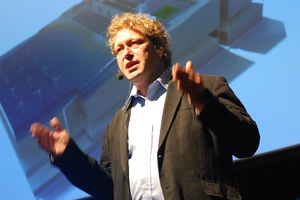
Working to discern patterns of environmental disinformation in an online world
For the past eight years, disinformation has dominated news around elections all over the world. Despite this, it is still a widely misunderstood con...
News

Publish date: December 15, 2011
Written by: Frederic Hauge
News
The way out of the European debt crisis will require shifting spending from importing fossil fuels toward investments in a sustainable energy chain based on renewable energy sources. Investment is squeezed between risk-adverse lenders and dire prospects for growth. In 2009, the EU spent more than €650bn, representing five per cent of its GDP – on importing fossil fuel – accounting for more than fifty per cent of its energy consumption. Greece only, before the economic crisis, spent almost nine per cent of its GDP – €20bn – on importing gas and oil from outside the EU. Burning fossil fuel also costs Europe €169 billion per year in damages to human health and the environment from air pollution, according to the European Environment Agency.
Fossil fuels are imported because they are cheaper than clean alternatives. But “Energy Roadmap 2050” makes a longer term and system-wide analysis of the costs of building and operating a sustainable energy system – including power generation, transmission cables, household equipment, transport fuels and so on. From this perspective, the EU’s current import-dependent energy system is not economically attractive compared to a new energy system with far lower fuel costs – and CO2 emissions.
The low carbon economy will require investments in physical capital not seen in Europe since the reconstruction after the Second World War. On average, about €270bn in additional investment is needed annually to reach CO2 emission reductions within the EU by 80 percent by 2050 (compared to 1990). As the biggest investment effort will be needed towards 2030, electricity costs will increase over the next twenty years. But as capital-intensive wind farms, solar power plants and insulated buildings are repaid, costs will then decrease so that by 2050, electricity prices will return to levels of a business as usual scenario. It will reduce the EU’s energy import dependency by about 40 percent.
The modeling of various decarbonisation scenarios done for the “Energy Roadmap 2050” shows that these results can be achieved by a number of different energy technology mixes. Some common denominators do appear. By implication, these deserve political priority.
Renewable energy will in all scenarios account for the majority of energy supply in the EU by 2050. This is particularly because a greater share of energy consumption will be from electricity. The renewable energy share of electricity could reach 86 percent, up from about 20 percent today.
The roadmap points out that CCS must be applied on all fossil sources from around 2030, and calls for a successful demonstration programme with a clear business case for CCS beyond 2020 for coal and gas to be a cost-efficient way to generate electricity. CCS can help balance the supply of electricity as increasing shares of wind and solar power increase intermittency. The road map also points out the possibility of combining sustainable biomass and CCS, leading to carbon negative solutions of removing CO2 from the atmosphere. It will imply producing sustainable biomass from mew sources such as the Sarah Forest Project that generates different types of biomass from seawater in the desert.
There must be better incentives to build more transmission lines to interconnect national markets. Grids must be made “smart” allowing for real-time communication between consumers and distributors.
The Commission’s impact assessment shows that all of this will be a cost-efficient energy system by 2050 – even in the event of cheap fossil fuels as a result of low demand following effective global action against climate change. If such action is not achieved and fossil fuels become more expensive, the savings for the EU could be substantially higher.
The Road map notes the risk of differential costs of industrial production inside and outside the EU leading to investment leakage. A level playing-field must be maintained for at least trade in power and cement with bordering non-EU countries in a simple and non-discriminatory fashion.
“Energy Roadmap 2050” demonstrates that fossil fuel imports are no longer a cheap steroid for the EU. The legislative follow-up to the roadmap may therefore be one of the most significant ways for the EU to trigger domestic investment so dearly needed to restore confidence and economic growth in Europe.
Frederic Hauge is President of the Bellona Foundation and member of European Commission ad hoc Advisory Group on EU Energy Road Map 2050

For the past eight years, disinformation has dominated news around elections all over the world. Despite this, it is still a widely misunderstood con...

A ruling by the European Free Trade Association Court that Norway’s continental shelf falls under the European Economic Area Agreement could dramatic...

Bellona held a seminar on countering Russian disinformation in the Arctic at the Arctic Frontiers international conference in Norway

Our December Nuclear Digest, reported by Bellona’s Environmental Transparency Center, is out now. Here’s a quick taste of three nuclear issues arisin...